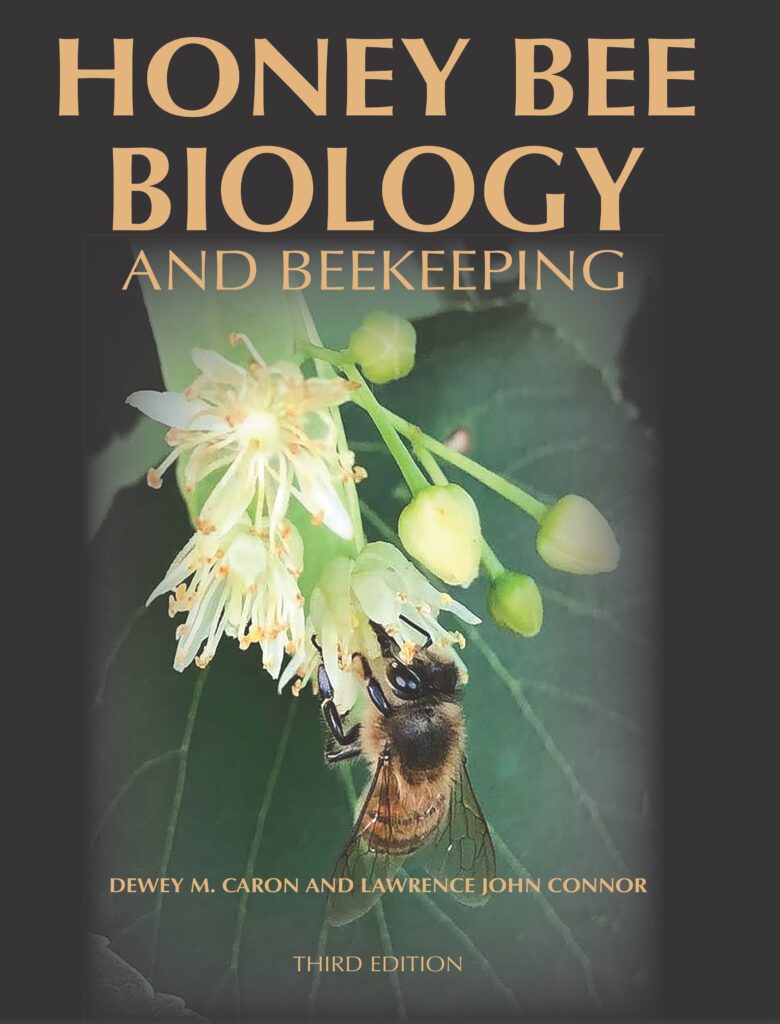Honey Bee Biology and Beekeeping
Third Edition

$90.00
Authors: Dewey M. Caron with Lawrence John Connor
Publisher: Wicwas Press
Ideal For: All serious beekeeping students, Master beekeepers and professional apiculturalists.
Binding: Hardcover
Dimensions: 8 5/16″ x 10 3/4″
Page Count: 480
First released in 1999, Honey Bee Biology and Beekeeping is widely accepted as a major textbook of Apiculture (beekeeping). Universities use it to teach college students bee biology and beekeeping. This is the third major revision of the text.
Beekeepers and bee clubs use it to teach other beekeepers.
It concentrates on the ‘why’, ‘how’ and ‘when’ of beekeeping. It explains bee and beekeeping basics in a manner meaningful to people who lack an extensive background in biology. Yet it is not over simplified, and provides a meaningful source of beekeeping information for the informed beekeeper.
The Third Edition has been carefully edited, updated and expanded to 480 pages. New chapters have been added, as have colorful new graphics and photographs. The Glossary has also been expanded.
This comprehensive textbook easily replaces many beginner books while adding comprehensive details of bee biology essential to becoming a successful beekeeper and student of the honey bee. Features many new full-color photos by the authors, selected beekeeper-photographers, as well as new color drawings by Jon Zawislak.
From Kim Flottum’s review of this book in Bee Culture:
•A major textbook of apiculture.
•It contains, in my opinion, at least 90 years of updated information.
•Each chapter has a Concepts box, which summarizes what the chapter is going to tell you.
•At the end of each of 23 chapters there is a section of discussion questions, exercises and the references cited in that particular chapter. As a teaching tool, these sections will be invaluable.
•Not a single page does not have an explanatory photo or three, along with a chart of diagram to further explain the information included.
•There is a glossary to die for, all 30 pages of it, followed by a very through index.
•This is hefty price for a book. However, you are really getting at least two very informative books here. And I ask carefully, what did that package of bees cost you this spring? Can you afford to lose it this next winter? Compare and contrast – saving even one package pays for this book. What is the value of your whole apiary? This book should stay on the dashboard of every beekeeper’s truck. It’s that good, and that necessary.
Ramesh Sagili, Professor-Apiculture
Oregon State University writes:
Honey Bee Biology and Beekeeping text book is a unique and outstanding resource for students, as it seamlessly integrates both biology and beekeeping aspects. I have used this book for my class for more than ten years.
Table of Contents
About the authors iii
Table of Contents v
How to use this book x
Section 1 Bee Biology xi
1. Introduction 13
2. What’s in a name? 31
3. Sociality 49
4. What is a honey bee? 63
5. Anatomy 78
6. Physiology 95
7. Pheromones 111
8. Dance language 127
9. The bees’ nest 145
10. Queens 161
11. Bee botany 179
Section 2 Beekeeping 209
12. Getting started 211
13. Management basics 229
14. Fall & winter 253
15. Spring 269
16. Honey production 286
17. Honey & other products 305
18. Queen & drone rearing 324
19. Nucleus colonies 344
20. Pollination 358
21. Bee mites 378
22. Diseases 402
23. Pests 419
Glossary 438
